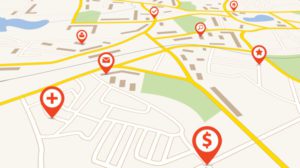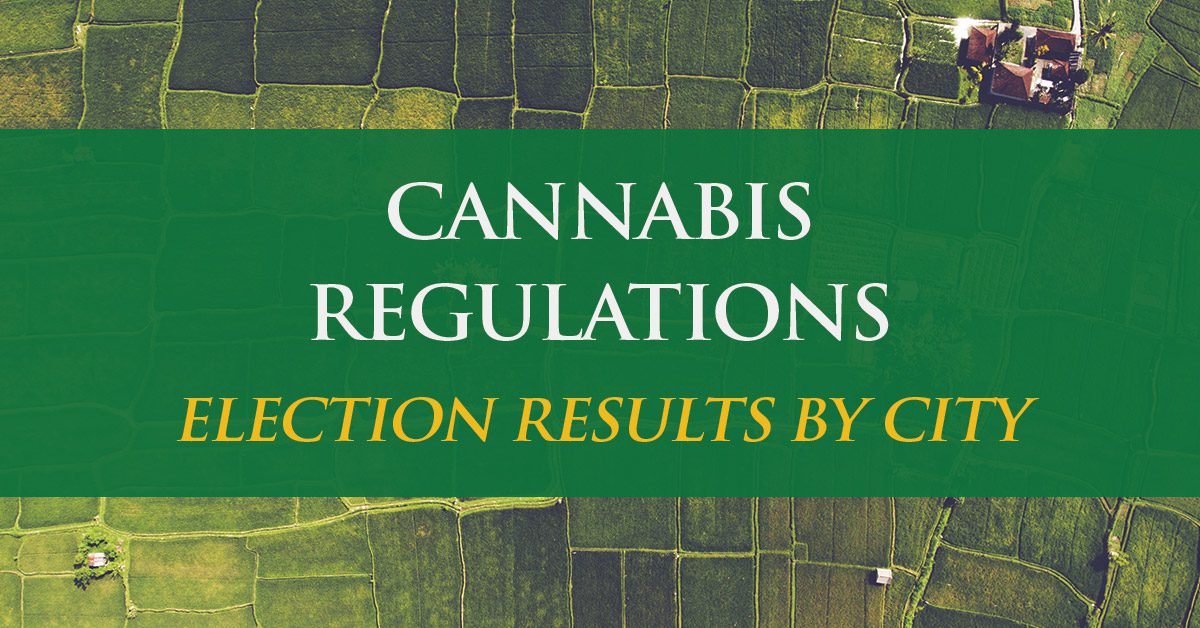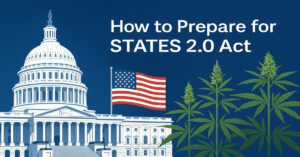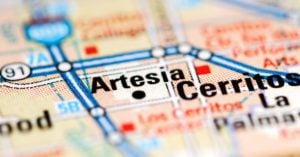Learn how the recent elections have affected cannabis regulations in multiple California cities!
In last weeks edition of our ongoing Cannabis Regulation Watch, we brought you a breakdown of the historic results of the election in legalizing cannabis in Arizona, Mississippi, Montana, New Jersey and South Dakota.
This week we will be breaking down the results of California municipalities with the most exciting cannabis proposals on their ballots, detailing the new licensing opportunities and cannabis tax rates in these cities.
Read on for the most up to date election results, and an explanation for what the rules and regulations will be in these newly cannabis friendly municipalities.

This report was prepared by Mitch Kreamer, Market Research Analyst at Cannabis Real Estate Consultants. Reach out with questions, our dedicated compliance team and expert real estate agents will help you take advantage of these newly open markets!
Did you know you can hire us to develop predictive analysis and custom maps? – Select any region you are pursuing and have a huge leg up on your competitors! The CREC Research Team can create custom maps for any municipality using the CREC Portal and provide the due diligence required for creating a complete picture of a region.
Contact CREC Team about ordering your custom regulation maps!
California Municipal Proposal Results
 While the landmark legalization of cannabis in Arizona, Mississippi, Montana, New Jersey and South Dakota might be getting most of the news attention, there are plenty of smaller municipal proposal results that will have a profound effect on the crowded and lucrative California market!
While the landmark legalization of cannabis in Arizona, Mississippi, Montana, New Jersey and South Dakota might be getting most of the news attention, there are plenty of smaller municipal proposal results that will have a profound effect on the crowded and lucrative California market!
There are openings in new cities for cannabis businesses and expanding uses available!
Read on for the details of California cities with measures to legalize or expand cannabis business opportunities.
Banning, CA
This cannabis friendly town in Riverside County voted overwhelmingly in support of Measure L to allow cannabis distribution businesses to operate in the city and places a 10% tax on gross receipts for these businesses. Banning already allows cultivators, retailers, manufacturers, and testing labs to operate in the city, so with the addition of distribution, nearly all forms of cannabis businesses are now welcome in the town.
Result: Passed 69.47% to 30.53%
Benicia, CA
This small city in the north of the San Francisco Bay area narrowly approved Measure D, supporting an advisory vote encouraging city council to approve additional retail licenses in the city. It is important to note this is just an advisory vote and the city council would still need to draft and approve an ordinance to expand the amount of licenses in the city, the opportunity to obtain a valuable retail license in the affluent and underserved north bay market is an exciting opportunity for anyone looking to jump into the cannabis industry.
Result: Passed 51.68% to 48.32%
Costa Mesa, CA
This city bordering the bustling Newport Beach and Irvine metro areas just became one of the first cities in Orange County to allow retail and delivery cannabis businesses to operate after its’ residents enthusiastically voted in support of Measure Q. This reverses the city’s previous ban on commercial cannabis, opening up the city to cannabis businesses for the first time and creating a pivotal opportunity in the sought after Orange County market.
While the city will have some leeway in developing the final details of zoning regulations, Measure Q restricts retail cannabis businesses to commercial zones. Delivery businesses will be allowed to operate from both commercial zones and a newly established green zone made up of portions of the manufacturing park (MP) and planned development industrial (PDI) zones that are located both north of South Coast Drive and west of Harbor Boulevard, excluding any portion of the South Coast Collection. All cannabis businesses will be required to be located no closer than 1,000 feet of schools, playgrounds, child care centers or homeless shelters.
Measure Q also establishes a tax rate for cannabis between 4% and 7% of gross receipts, to be determined by the final city ordinance when passed.
Result: Passed 65.19% to 34.81%
Encinitas, CA
The beach town of Encinitas in the north county area of San Diego became one of the first cities in north county to allow commercial cannabis, after its residents approved Measure H in a hard fought vote.
The city will allow up to four retail dispensary licenses, as well as indoor and greenhouse cannabis cultivation, non-volatile manufacturing, and industrial hemp cultivation. The city will also allow cannabis kitchens, a new type of cannabis license that allows for the creation of edible cannabis products without concentrate extraction in a commercial kitchen.
Result: Passed 51.17% to 48.83%
Jurupa Valley, CA
In a rare loss for cannabis in this elections, the residents of Jurupa Valley narrowly rejected Measure U, a proposal which would have expanded the amount of retail licenses in the city from seven to nine, and increased the tax rate for cannabis businesses in the city.
Result: Failed 48.96% to 51.04%
Laguna Woods, CA
Another election result in Orange County, La Habra also represents an opportunity to open up retail businesses in this lucrative market after residents voted to approve measure Q, an advisory vote to allow retail cannabis businesses to operate in the city. All types of commercial cannabis businesses are currently banned within the city.
Just like Benicia’s proposal described above, this was an advisory vote only, meaning city council will still have to draft and pass an ordinance before retail cannabis dispensaries will be officially legal in the city, but this is a perfect time to get ahead of the competition and start scouting potential retail locations in the city before the rush to find a property after the city passes its regulations.
Result: Passed 50.88% to 49.12%
La Habra, CA
In our final election result from Orange County, the residents of La Habra voted in a massive wave of support to approve measure W, allowing delivery cannabis businesses to open up within city limits. Located in the northwestern corner of Orange County and bordering Los Angeles County, delivery businesses here will have a unique opportunity to supply two gigantic markets.
Under Measure W, the city can award up to four delivery cannabis licenses to businesses in the city, and sets a tax rate of up to 6% gross receipts on these new businesses.
Result: Passed 67.63% go 32.37%
Mount Shasta, CA
In another cannabis legalization loss, voters rejected Measure L, which would have supported allowing cannabis businesses in the town.
Result: Failed 40.45% to 59.55%
Pomona, CA
The city of Pomona in the east side of Los Angeles county had two separate cannabis proposals on the ballot, both of which were approved by residents. Measure PO adopts and affirms the City’s existing four-phase, merit-based Commercial Cannabis Permit Program (Ordinance No.’s 4257/4273), which results in up to eight commercial cannabis permits. Permits may only be located within the approved overlay, guaranteeing a 1,000-foot buffer from K-12 schools, day care centers, and youth-serving facilities (including City parks).
Measure PM eventually passed by a much narrower margin after initial results and reporting suggested the measure may not pass. The measure changes a variety of cannabis zoning restrictions and regulations, most notably reducing the setback buffer from sensitive uses from a 1,000-foot to 600-foot buffer and creating new creating the “Safe Access Cannabis” (SAC) and “Industrial Cannabis” (IC) overlay zones in addition to the currently zoned areas opening up a number of new properties to be zoned for cannabis uses.
It is unclear at this point how the city will reconcile the two different measures but stay tuned for more updates on the situation form our cannabis regulation research team. You can read this fact sheet prepared by the city to learn more about the differences between these two measures.
Result: Measure PO passed 59.02% to 40.98%, Measure PM passed 50.89% to 49.11%.
Solana Beach, CA
Voters in this San Diego north county suburb, near the city of Encinitas mentioned earlier, defeated Measure S which would have allowed at least two storefront marijuana retailers along with indoor cultivation and delivery.
The city currently prohibits all cannabis businesses.
Result: Failed 38.10% to 61.90%
Ventura County, CA
Voters in this Southern Californian county voted to approve Measure O, which allows cultivation and nurseries to operate in the unincorporated areas of the county and places a tax of 4% of gross receipts on general cultivation and 1% of gross receipts on nursery cultivation.
Measure O requires all cultivation to be located in a pre-existing permanent greenhouse or indoor facility, not exceed 500 acre of total canopy, and prohibits all outdoors and hoop house cultivation.
Results: Passed 56.99% to 43.01%
Yountville, CA
In another rare cannabis loss on election day, the citizens of this small town in the Napa Valley area famous for its wine voted down a proposal to legalize cannabis businesses in the city.
Result: Failed 32.53% to 67.47%
Several California cities that currently allow commercial cannabis businesses in the city vote to establish new cannabis tax rates, as well as many that currently ban commercial uses, perhaps signaling the first step in bringing forth regulations to allow cannabis businesses to operate in their cities.
Hire our team to develop predictive analysis and custom maps
 Order custom cannabis regulation maps and find key locations for cannabis businesses by region.
Order custom cannabis regulation maps and find key locations for cannabis businesses by region.
Reach out to get a quote on our custom maps that also come with 3-month free access to the CREC Portal where you can do your own research in our platform built for cannabis real estate research.
Cannabis Tax Measure Results in CA Cities
Artesia
This LA suburb approved Measure Q, authorizing a 15% gross-receipts tax and a tax of $20 per square foot for marijuana cultivation.
Calaveras County
The eastern Sierra county, approved Measure G, a new cultivation tax structure based on square foot of canopy, instead of the current tax that’s based on the total weight of cannabis produced.
Calabasas
Voters approved Measure C in this small town northwest of Los Angeles, establishing a general cannabis business tax up to 10% on gross receipts. The city currently doesn’t allow any cannabis business uses but this tax measure could signal a first step in the city moving towards legalization.
Fairfield
This county seat of Solano County in the North Bay sub-region of the San Francisco Bay Area approved a cannabis ordinance earlier this year to allow retail, manufacturing and testing labs in the city. Voters now approved Measure C, which authorizing a marijuana business tax of 6% of gross receipts for retail businesses, 4% of gross receipts for other businesses, and $10 per square foot for cultivation.
Grass Valley
Voters in this Sierra mountain town approved Measure N, establishing an 8% gross-receipts tax for retailers, a 6% gross-receipts tax for other cannabis businesses and a cultivation tax up to $7 per square foot.
Hawthorne
In this Los Angeles suburb, voters approved Measure CC, creating 5% gross receipts general cannabis business tax. The city currently prohibits all marijuana businesses.
King City
A majority of voters in this agricultural town in Monterey County voted in support Measure P, allowing the City Council to establish a gross-receipts tax on marijuana products of up to 5%, and a separate gross-receipts tax of up to 2% for the distribution of marijuana and marijuana products from outside King City.
Lemon Grove
Voters in this San Diego suburb approved Measure J, a cannabis business tax of up to 8% of gross receipts. While this city currently only allows medical marijuana dispensaries, this yet vote may open the door of an expansion to include recreational businesses.
Madera
Voters in this Central Valley town approved Measure R, which will establish a general cannabis business tax of up to: $10 per square foot of canopy for cultivators, 6% of gross receipts for retailers and 4% of gross receipts for all other business types. The city currently prohibits all commercial cannabis uses.
Marina
This Monterey County town handily approved Measure Z, which will enact new zoning restrictions for marijuana businesses and maintain a 5% gross-receipts tax.
Marysville
Voters in this town in the Sacramento area approved Measure N, a general marijuana and hemp business tax of up to: $10 per square foot of canopy for cultivation, 6% of gross receipts for retailers, and 4% gross receipts for all other businesses.
Ojai
Voters in this city near Santa Barbara approved Measure G, a general cannabis business tax beginning at 3% gross receipts for all cannabis businesses with the option for city officials to increase the tax rate in the future up to 10%.
Porterville
Voters in this Central Valley town approved Measure R, a general cannabis business tax of up to $25 per square foot of canopy for cultivation or 10% of gross receipts for all other businesses.
San Bruno
Voters in this South San Francisco suburb supported Measure S, a general cannabis business tax of up to 10% of gross receipts despite currently banning all commercial uses.
San Joaquin County
This Californian county in the central valley, home to the city of Stockton, approved Measure X, a general cannabis business tax of 3.5%-8% of gross receipts for all business types as well as an annual $2-per-square-foot fee for cultivation.
Sonoma
The city’s voters had two proposals to vote on, Measure X and Measure Y.
Measure X, passed and establish a general cannabis business tax of up to 4% for retailers, manufacturers and indoor cultivators; 3% for distributors; 2.5% for outdoor cultivators; and 2% for testing labs.
Measure Y, would have expanded personal cultivation rights and reduced restrictions for cannabis businesses in the city, but failed to garner enough support to pass.
Tracy
This town in the Central Valley approved Measure W, which establishing a cannabis business tax of 6% of gross receipts for retailers, $12 per square foot for cultivators and 4% for all other business types.
Trinity County
Voters in this county located in the Emerald Triangle in the northwestern part of the state of California approved Measure G, setting cultivation tax rates with a unique mechanism based on the part of the plant used. Measure G sets a cultivation tax rate of $15.44/lb for cannabis flower,$4.59/lb for marijuana leaves, and $2.16/lb for fresh cannabis plant material. The measure also sets a 2.5% gross receipts tax on retailers, despite the county’s current ban on retail businesses.
Vacaville
This rural town, located roughly halfway between Sacramento and San Francisco, approved Measure V, a general cannabis business tax of 6% of gross receipts for retail, 3% for distribution, 2% for testing, and $10 per square foot for cultivators. The city currently prohibits all marijuana businesses.
Ventura
Voters in the city of Ventura, just north of L.A., adopted Measure I, a general cannabis business tax of up to $10 per square foot of canopy for cultivators, 8% gross receipts for retailers and 4% for all other business types. Unlike the county of Ventura mentioned earlier, the city currently prohibits all cannabis businesses.
Ask Us a Cannabis Regulations Question Here:
CREC is the leading brokerage and compliance firm closing cannabis transactions throughout the United States. Contact us to find out more about the new rules and regulations in the United States, and we will help you get ahead of the competition and find viable properties in these new exciting markets!





